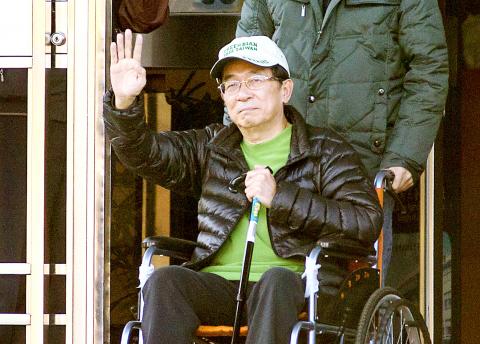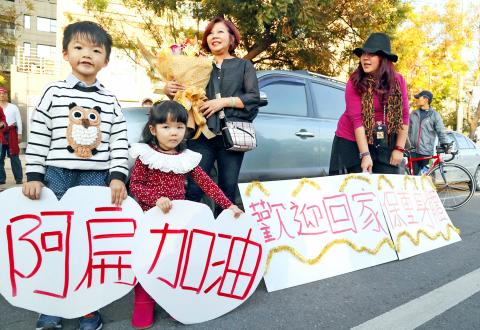Ailing former president Chen Shui-bian (陳水扁) was released from prison on medical parole yesterday, after serving six years for a graft conviction relating to his presidency.
Chen, in a wheelchair and holding a cane, left the prison accompanied by his son, Chen Chih-chung (陳致中), for a month of medical treatment. He waved to a group of supporters waiting outside before boarding a car arranged by prison authorities to take him to his home in Greater Kaohsiung.
As his motorcade — led by police motorcycles — left the prison, some supporters shouted: “A-bian (陳水扁) is not guilty,” and “Go, A-bian,” using the former president’s nickname.

Photo: Reuters
The motorcade navigated throngs of supporters and reporters outside the prison for 10 minutes before breaking free and heading on its way.
Earlier yesterday, a 10-member review panel at the Ministry of Justice’s Agency of Corrections decided to grant the parole in the light of recommendations from a team of doctors who reported a rapid deterioration of Chen Shui-bian’s health since May last year, Deputy Minister of Justice Chen Ming-tang (陳明堂) said.
“His health conditions are complicated and difficult to control. He could die at any time,” Chen Ming-tang said.

Photo: CNA
In a statement, the agency cited the medical team’s report, saying that the 64-year-old is experiencing loss of motor control.
“This type of degeneration occurs in different parts of the brain simultaneously,” it said.
It added that although Chen Shui-bian was being treated by a team of doctors from Taichung Veterans General Hospital, he has not shown any obvious improvement, except for with his sleep apnea.
After careful observation, the medical specialists reported that Chen Shui-bian’s prison environment did not help his health and would lead to worsening illness, the agency said.
The physicians concluded that confinement had seriously affected his health and recommended that he be sent home for care on medical parole, the agency said.
It stressed that the parole is a temporary release on medical grounds and that Chen Shui-bian is required to return to prison once his health stabilizes.
“The parole period will not count toward his prison term,” the agency added.
Taipei Mayor Ko Wen-je (柯文哲), who is also the convener of Chen Shui-bian’s healthcare working group, yesterday called the latter’s release “just the beginning,” given the substantial work ahead in designing a healthcare plan for the veteran politician.
“His going home is not as easy as it looks,” Ko said. “Thought has to be put into his environment and care.”
He gave as an example the need to protect Chen Shui-bian from accidental falls after he gets home.
Ko also expressed support for efforts to curtail the ministry’s power to rule on medical parole cases.
“Chen Shui-bian’s case has shown us that there are no clear rules on the conditions under which prisoners are to be released to receive medical care,” Ko said. “Allowing prison wardens or the Ministry of Justice to unilaterally decide is not ideal, in my opinion.”
Chen Shui-bian was transferred to a prison hospital in April last year after being diagnosed with severe depression, suspected Parkinson’s disease and other conditions.
He attempted to commit suicide in June last year, trying to hang himself with a towel in a prison hospital bathroom, officials said.
Chen Shui-bian’s supporters have recently stepped up their campaign for his early release.
His former deputy, former vice president Annette Lu (呂秀蓮), 70, undertook a three-day hunger strike in a tent late last month to demand that he be freed.
The former Democratic Progressive Party leader ended 50 years of continuous Chinese Nationalist Party (KMT) rule when he came to power in 2000.
After his second term ended in 2008, Chen Shui-bian was sentenced to life in prison in 2009 for money laundering and bribery — a term reduced to 20 years after appeals.
He began serving his sentence on Nov. 11, 2010, but had been detained for nearly two years by then, while prosecutors were investigating and prosecuting the cases.
Chen Shui-bian insists that the charges against him are part of a politically motivated vendetta by the current KMT government in retaliation for his eight years in power promoting Taiwan’s independence.
Additional reporting by Abraham Gerber

CHAOS: Iranians took to the streets playing celebratory music after reports of Khamenei’s death on Saturday, while mourners also gathered in Tehran yesterday Iranian Supreme Leader Ayatollah Ali Khamenei was killed in a major attack on Iran launched by Israel and the US, throwing the future of the Islamic republic into doubt and raising the risk of regional instability. Iranian state television and the state-run IRNA news agency announced the 86-year-old’s death early yesterday. US President Donald Trump said it gave Iranians their “greatest chance” to “take back” their country. The announcements came after a joint US and Israeli aerial bombardment that targeted Iranian military and governmental sites. Trump said the “heavy and pinpoint bombing” would continue through the week or as long

TRUST: The KMT said it respected the US’ timing and considerations, and hoped it would continue to honor its commitments to helping Taiwan bolster its defenses and deterrence US President Donald Trump is delaying a multibillion-dollar arms sale to Taiwan to ensure his visit to Beijing is successful, a New York Times report said. The weapons sales package has stalled in the US Department of State, the report said, citing US officials it did not identify. The White House has told agencies not to push forward ahead of Trump’s meeting with Chinese President Xi Jinping (習近平), it said. The two last month held a phone call to discuss trade and geopolitical flashpoints ahead of the summit. Xi raised the Taiwan issue and urged the US to handle arms sales to

BIG SPENDERS: Foreign investors bought the most Taiwan equities since 2005, signaling confidence that an AI boom would continue to benefit chipmakers Taiwan Semiconductor Manufacturing Co’s (TSMC, 台積電) market capitalization swelled to US$2 trillion for the first time following a 4.25 percent rally in its American depositary receipts (ADR) overnight, putting the world’s biggest contract chipmaker sixth on the list of the world’s biggest companies by market capitalization, just behind Amazon.com Inc. The site CompaniesMarketcap.com ranked TSMC ahead of Saudi Aramco and Meta Platforms Inc. The Taiwanese company’s ADRs on Tuesday surged to US$385.75 on the New York Stock Exchange, as strong demand for artificial intelligence (AI) applications led to chip supply constraints and boost revenue growth to record-breaking levels. Each TSMC ADR represents

State-run CPC Corp, Taiwan (CPC, 台灣中油) yesterday said that it had confirmed on Saturday night with its liquefied natural gas (LNG) and crude oil suppliers that shipments are proceeding as scheduled and that domestic supplies remain unaffected. The CPC yesterday announced the gasoline and diesel prices will rise by NT$0.2 and NT$0.4 per liter, respectively, starting Monday, citing Middle East tensions and blizzards in the eastern United States. CPC also iterated it has been reducing the proportion of crude oil imports from the Middle East and diversifying its supply sources in the past few years in response to geopolitical risks, expanding